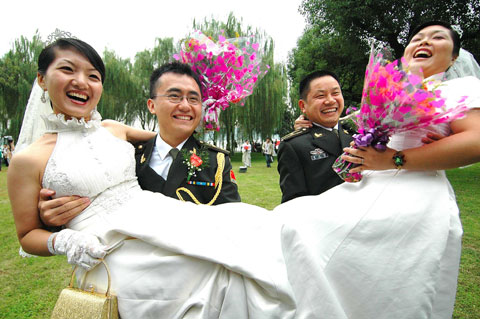http://online.wsj.com/public/article/SB117278021348123785-f2W12JaQJ5IBURfwG84ZZMKfzZ0_20070308.html?mod=regionallinks
BEIJING -- China's leadership is stepping up its efforts to build a legal system that can handle the demands of a complex, market-driven economy, as managing the fast-growing nation becomes increasingly challenging.
That program will take the spotlight when China's legislature opens its annual session on Monday. The National People's Congress is scheduled to consider, and most likely pass, two crucial pieces of economic legislation. One would give private property new protections of unprecedented force and detail for China; another would require foreign and domestic companies to pay the same rate of tax.
The property-rights law will be a symbolic milestone for the still nominally Communist nation, even though it falls far short of what more liberal reformers had initially advocated. For foreign businesses, the tax law will put them on a more-equal footing with local competitors, as it gradually brings an end to most of the special breaks offered in the past. Several other important laws will also be discussed at the meeting for passage later this year, including the country's first antitrust legislation and a measure that would give workers more say in contracts with their employers.
All of these are the building blocks of the legal infrastructure that underpins the daily functioning of a market economy, although the country's legal code is still in its infancy and legal redress can be difficult to come by. Many of these laws have been in the works for years, and have provoked sometimes heated debate. They are coming to fruition this year as a consensus grows that the new legislation can fill some gaping holes and rectify obvious inequities in the current system.
"China is, step by step, going down the road of the market economy," said Sheng Jiemin, an expert on antitrust legislation at Peking University. "The government had to revise many laws after China joined the World Trade Organization. And other necessary measures are being regularly issued."
The annual meeting of the National People's Congress, when nearly 3,000 delegates gather in Beijing, is one of the few occasions when China's leaders discuss their policies in public. Given the turmoil in China's stock markets this week, as fears spread that a government crackdown on speculation was imminent, this year's meeting is likely to be particularly closely watched for signals on financial policy, as well as progress in lawmaking.
China's economy has been changing much faster than the legal system that is supposed to govern it. Huge numbers of Chinese now own their own homes and run their own businesses, but it is difficult to settle precisely who owns what and what they are allowed to do with it.
Private-property rights, in the abstract, have been recognized in China's constitution through a series of amendments, the earliest in 1988. But those vague principles are of little help in handling specific cases, such as the government's frequent confiscation of land for development. That is a big reason for passing the property-rights law, which details the scope of different types of rights and sets rules for how to change or transfer them.
"The property-rights law tells you what is yours and what is his, and how it can be obtained or transferred. Without that, it's impossible to solve property disputes," said Mei Xiaying, a professor at the University of International Business and Economics in Beijing. Businesses in particular will welcome the clarification of property rights, which should make it easier to buy and sell major assets such as land, he said.
The legal overhauls have been controversial: The proposed property-rights law, in particular, attracted vocal opposition from leftist scholars who worry that it will pave the way for the accelerated privatization of state companies and widen the gap between the wealthy and the poor.
The draft antimonopoly law, under discussion for more than a decade, has also been held hostage by disputes among policymakers. Some want to use it to break open still-closed parts of the economy, while others see giving the government new antitrust powers as a way to strengthen its control over businesses -- particularly powerful foreign companies that have dominant market share in China.
Though its laws aren't subject to popular vote, the Chinese government does usually try to build a consensus among its officials before pushing through a major policy change. The property-rights law had been scheduled for passage at last year's meeting before a critical backlash took it off the agenda, and even the less-sensitive tax overhaul has been held up for years. Changes were made to the draft laws last year to address the criticisms.
With those laws having now been declared ready for passage, 2007 is shaping up to be a landmark year for legislation governing the economy -- after several technical measures, including China's first code for corporate bankruptcies, were passed in 2006. As all these new laws fall into place, scholars say, China's commercial code is finally getting close to completion.
The new measures will reinforce China's shift toward relying on law and legal processes, rather than government dictates alone, to manage the economy -- an ideal that has been endorsed by the highest levels of the leadership.
In a major speech late last year, the Communist Party's top law-and-order official, Luo Gan, said the government needs to "get better at using legal methods to harmonize economic relationships." If the legal system can help citizens settle their problems with employers, schools, and hospitals, he said, that promises to "fundamentally reduce social conflicts triggered by the conflict of interests."
Mr. Luo also appeared to recognize the importance of fairness in encouraging companies and individuals to turn to the legal system to resolve their disputes, saying it should "protect equally the legal interests of all types of market participants, [and] eliminate the appearance of bias in law enforcement." In practice, court decisions are heavily influenced by the government, and it is often difficult for individuals to use the legal system to counter official government actions.
All that doesn't mean Mr. Luo and other leaders endorse the idea of an independent judiciary. Party leaders say their goal is to "rule the country according to law." The idea is for the Communist Party's to exercise its power through the legal system, not just arbitrary commands, but it doesn't mean the party's authority is itself subject to the judgment of the law.











